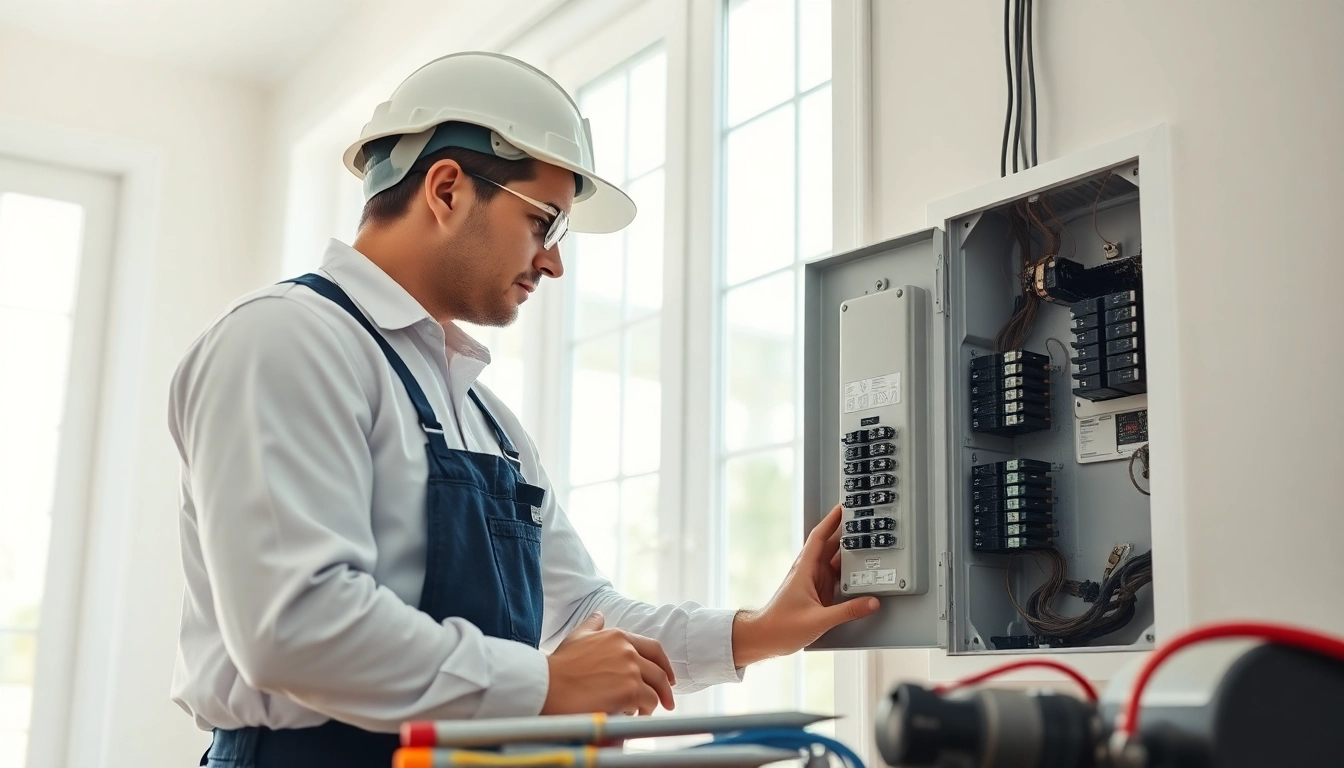Understanding Electrical Panels and Their Importance
When it comes to the safety and efficiency of your home’s electrical system, the electrical panel is a pivotal component. Often referred to as the heart of your home’s electrical system, it is responsible for distributing electricity from the main supply to various circuit breakers or fuses that provide power throughout your residence. Knowing when to upgrade your electrical panel is crucial, especially if you reside in an area like Clearwater, where homes can have varying electrical needs based on age, renovations, or enhancements in technology. For further insights on the topic, you can refer to Electrical Panel Clearwater.
What is an Electrical Panel Clearwater?
An electrical panel, often known as a breaker box or fuse box, is a metal box that houses circuit breakers or fuses. These essentially act as the gateway for electricity entering your home and serve multiple purposes: they protect your electrical circuits from overloads, distribute electricity to various branches of your home and provide a mechanism to shut off electrical flow for safety or maintenance. Understanding the specifics of your electrical panel is paramount for homeowners looking to manage their electrical system effectively.
The Role of Electrical Panels in Home Safety
Electrical panels play a critical role in ensuring the safety of your home by preventing potential electrical fires and equipment damage. Each circuit within your home is designed to handle a specific load, and the panel protects these circuits by shutting off power when there are demands that exceed safe levels. This overload protection guards against overheating and potential malfunctions. Additionally, modern panels may include additional features such as Ground Fault Circuit Interrupters (GFCIs) and Arc Fault Circuit Interrupters (AFCIs), which further enhance safety.
Signs You Need an Electrical Panel Upgrade Clearwater
Identifying the need for an upgrade is crucial to ensure your home remains safe and efficient. Here are some common signs to look out for:
- Frequent Circuit Breaker Trips: If your breakers are tripping frequently, this indicates overloading issues which can be a sign that your panel is unable to handle your home’s power needs.
- Flickering or Dimming Lights: Such lights suggest insufficient power supply to certain areas of your home, hinting at possible panel inadequacies.
- Age of the Panel: Older panels, particularly those over 20-30 years, may not meet modern electrical demands and standards.
- Corrosion or Damage: Physical damage, rust, or corrosion can make a panel unsafe and warrants immediate assessment.
- Upgraded Appliances: If you have installed high-capacity appliances which require more power, it may necessitate a panel upgrade.
Common Types of Electrical Panels
Differences Between Circuit Breaker and Fuse Panels
The two most common types of electrical panels are circuit breaker panels and fuse panels. Circuit breaker panels utilize a spring-loaded mechanism that automatically shuts off electricity flow when it exceeds a safe level. This resettable functionality makes circuit breaker panels more user-friendly. On the other hand, fuse panels contain fuses that melt if they exceed current limits, thus cutting off electricity. While still functional, fuse panels are considered outdated and may not meet the safety standards required by today’s codes.
Choosing the Right Size of Electrical Panel Clearwater
Choosing the right size for an electrical panel is crucial when upgrading. Generally, the size is determined by the total expected load, measured in amperes. For most modern homes, a panel rated at 200 amps is standard, accommodating the electrical demands of larger homes and modern appliances. However, smaller homes or those with minimal appliances may only require a 100-150 amp panel. Conducting a load calculation and consulting with an electrician can help ensure you select the appropriate size for your needs.
Smart Panels: An Overview of Advanced Options
Modern technology has introduced smart electrical panels, offering advanced features that enhance home efficiency and security. Smart panels allow homeowners to monitor energy consumption through apps and can alert you to potential problems in real-time. Some smart panels even integrate with home automation systems, offering the ability to control various devices remotely. This innovative approach not only improves convenience but also empowers homeowners to take proactive measures against electrical issues.
Factors to Consider When Upgrading Your Electrical Panel Clearwater
Assessing Your Home’s Power Needs
Understanding your home’s power requirements is the first step in determining if an upgrade is necessary. Factors include the number of electrical devices, appliances, and the home size. Conducting a thorough assessment can help outline the wattage each circuit will need to handle without tripping breakers or creating safety hazards. A qualified electrician can assist in this assessment, ensuring precise calculations and recommendations based on current use and future needs.
Safety Standards and Code Compliance
Upgrading your electrical panel requires adherence to local building codes and safety standards. Most jurisdictions set forth regulations that dictate how much power can be distributed safely. When contemplating an upgrade, it’s essential to familiarize yourself with these codes to ensure compliance and avoid penalties later. A licensed electrician can help navigate these regulations, ensuring your new panel meets or exceeds all safety standards.
Cost Considerations for Panel Upgrades
The cost of upgrading an electrical panel can vary significantly based on several factors, including the panel size, type, labor costs, and any necessary repairs or changes to the existing wiring. Homeowners should expect a range of anywhere from $800 to $2,500 for a complete panel upgrade. Budgeting for unexpected issues that may arise during the upgrade process, such as rewiring or code updates, is also wise. It’s critical to obtain and compare quotes from multiple professionals to ensure you’re paying a fair price.
Step-by-Step Guide to Upgrading Your Electrical Panel Clearwater
Preparing for the Installation Process
Preparing for electrical panel installation involves several critical steps. Start with thorough research on local electricians, checking reviews, credentials, and references. Once you’ve chosen a qualified professional, schedule a consultation to discuss your needs and expectations. It’s also essential to review the electrical panel installation process with your electrician to understand what will happen, including how long the installation will take and any necessary steps beforehand.
Understanding the Installation Timeline
The installation timeline for an electrical panel upgrade can typically range from a few hours to a full day, depending on the complexity of the installation and any necessary changes to existing wiring. The process generally involves disconnecting the power, removing the old panel, installing the new panel, and finally reconnecting the electricity. Proper planning and working with an experienced contractor can streamline the installation process and minimize downtime.
Post-Installation Checklist to Ensure Safety
After installation, ensure all work is documented, including any permits obtained. Test all the circuits to confirm they function properly without tripping any breakers. Additionally, consider having an electrician perform a safety inspection to verify that all connections are secure and up to code. Regular maintenance checks on your panel can prevent future issues, ensuring your home’s electrical system remains safe and efficient.
Frequently Asked Questions about Electrical Panels Clearwater
How Long Does an Electrical Panel Last?
The lifespan of an electrical panel can typically range from 25 to 40 years, depending on maintenance, usage, and quality of installation. Regular inspection and addressing issues as they arise can extend the life of your panel and improve its performance.
Can I Install an Electrical Panel Myself?
While it may be tempting to handle electrical panel installation as a DIY project, it is highly advised against. Electrical work poses significant risks, including electrical shocks and fire hazards. Professional electricians are trained to undertake these tasks safely and legally, ensuring compliance with local codes and regulations.
Finding Qualified Electrical Panel Service Providers in Clearwater
To find qualified service providers for your electrical panel needs, start by seeking recommendations from friends and family. Online reviews and ratings on platforms like social media and local business directories can also provide insight into a company’s reliability and reputation. Once you’ve narrowed your options, scheduling consultations can help you gauge the professionalism and expertise of potential electricians.




